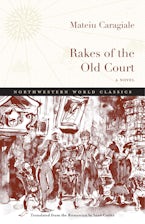FICTION / Classics
Showing results 1-10 of 32
Filter Results OPEN +

Rakes of the Old Court
This novel of decadence and debauchery, set in Bucharest in 1910, follows four characters through bars, brothels, and landscapes of travel and escape. The 1929 book is a classic of Romanian modernism.
Trixy
Trixy is a 1904 novel by the American writer and activist Elizabeth Stuart Phelps, best known in her lifetime as the author of the best-selling The Gates Ajar. Trixy is an early novel of the animal rights movement and sought to turn public opinion against vivisection.
William Warner's Syrinx
William Warner’s Syrinx, or a Sevenfold History, may be the first English novel. Unlike others of the time, though, Warner wrote a realistic novel whose ancestors include the adventure...
Collected Stories
In Collected Stories, Madeline G. Levine provides a definitive new translation of the complete fiction of Jewish-Polish writer Bruno Schulz, considered among the most influential European writers of his generation.
The Essential Fictions
Isaac Babel: The Essential Fictions is a collection of seventy-two of Isaac Babel’s finest short stories and includes Red Cavalry, Odessa Stories, and the “Dovecote” cycle. Newly edited, translated, and annotated by Val Vinokur, this collection also features illustrations by Babel’s fellow Odessan Yefim Ladyzhensky.
Billy Budd, Sailor and Other Uncompleted Writings
The gripping tale of a handsome and charismatic young sailor who runs afoul of his ship’s master-at-arms, is falsely accused of inciting a mutiny, and hung, Billy Budd, Sailor is often...
A Hero of Our Time
Mikhail Lermontov’s A Hero of Our Time was the first modern Russian novel. Published in 1840, it set a model of penetrating observation and psychological depth that would come to typify Russian literature. Its "hero," Grigorii Pechorin, also established a character type that became known in Russian fiction as "the superfluous man"—widely familiar from Dostoevsky’s Notes from Underground. At once driven by pride and wracked by self-doubt, both shockingly self-revealing and blindly self-deceived, he flounders to affirm himself in a social world he despises yet yearns to dominate.
The Athenaeum
Originally published as O Ateneu in 1888, The Athenaeum is a classic of Brazilian literature, here translated into English in its entirety for the first time. The first-person narrator, Sergio, looks back to his time at the eponymous boarding school, with its autocratic principal and terrifying student body. Sergio’s account of his humiliating experiences as a student, with its frank discussion of corruption and homoerotic bullying, makes it clear that his school is structured and administered so as to reproduce the class divisions and power structure of the larger Brazilian society.
The Sylph
This ranging epistolary novel follows Julia Grenville, a Welsh beauty who knows little of the world until her marriage to the older Lord Stanley. Through Julia’s...

Rakes of the Old Court
Trixy
William Warner's Syrinx
Collected Stories
The Essential Fictions
Billy Budd, Sailor and Other Uncompleted Writings
A Hero of Our Time
Mikhail Lermontov’s A Hero of Our Time was the first modern Russian novel. Published in 1840, it set a model of penetrating observation and psychological depth that would come to typify Russian literature. Its "hero," Grigorii Pechorin, also established a character type that became known in Russian fiction as "the superfluous man"—widely familiar from Dostoevsky’s Notes from Underground. At once driven by pride and wracked by self-doubt, both shockingly self-revealing and blindly self-deceived, he flounders to affirm himself in a social world he despises yet yearns to dominate.
The Athenaeum
Originally published as O Ateneu in 1888, The Athenaeum is a classic of Brazilian literature, here translated into English in its entirety for the first time. The first-person narrator, Sergio, looks back to his time at the eponymous boarding school, with its autocratic principal and terrifying student body. Sergio’s account of his humiliating experiences as a student, with its frank discussion of corruption and homoerotic bullying, makes it clear that his school is structured and administered so as to reproduce the class divisions and power structure of the larger Brazilian society.










